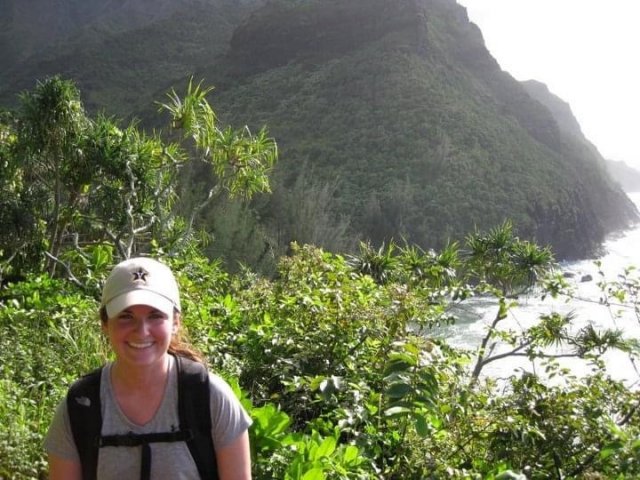Meet EPA Scientist Katherine Ratliff, Ph.D.

Dr. Katherine Ratliff researches how to improve public health protections against harmful contamination in the environment. She is currently focused on evaluating different types of technologies and methods aimed at reducing the risk of exposure to pathogens in the built environment. This includes assessing different types of air cleaning and treatment technologies that could be used against infectious aerosols, as well as testing devices that are designed to inactivate viruses and microorganisms on surfaces. In January 2025, Katherine was awarded the Presidential Early Career Award for Scientists and Engineers (PECASE), the highest honor bestowed by the U.S. government on outstanding scientists and engineers early in their careers.
Tell us about your background.
I have a B.A. in Earth and Environmental Sciences from Vanderbilt University and received a Ph.D. in Earth and Ocean Sciences from Duke University. After finishing my Ph.D. in 2017, I started at EPA as an ORISE postdoc in the National Homeland Security Research Center. In 2019, was hired as a federal postdoc, and then I started in my current role as a principal investigator in 2020.
When did you first know you wanted to be a scientist?
I always enjoyed being outside growing up, but I never thought I’d end up being a scientist. It wasn’t until I took some Earth science classes in college that I realized I’d found my niche. I also had the opportunity to lead and participate in a variety of research projects as an undergraduate, which was not only great work experience, but it also caused me to fall in love with the research process.
What do you like most about your research?
I am highly motivated by the applied nature of our research. We work closely with our partners to ensure that we are addressing the most urgent needs and challenging questions, which then makes it easy to see the direct positive impact of my work as we deliver actionable and impactful results to the end users.
How does your science matter?
In my research, I develop and evaluate the technologies and solutions that can effectively reduce the risk of exposure to harmful contamination, particularly in challenging situations and complex settings. These methods and tools are critical for protecting public health and the environment. My work also helps to develop standards and guidelines for testing the effectiveness of these technologies.
If you weren’t a scientist, what would you be doing?
Before I realized my passion for conducting research and the scientific process, I thought I wanted to be a lawyer. If I weren’t generating the data to support critical decision making, I imagine it could be fulfilling to protect public health and the environment in that capacity.
What advice would you give a student interested in a career in science?
Sometimes it can be hard to see the rationale for why we study certain subjects. If you’re having a hard time understanding why a particular topic is important, ask your friends, family, or neighbors about how they’ve used what they learned about that subject outside of school, or look up different types of applications of whatever you’re studying. I’ve always found it more motivating to focus on a particular topic when I see examples of how it can be applied in the real world.
What do you think the coolest scientific discovery was and why?
The Navier-Stokes equations, which describe the motion of fluids, have made such an important impact on so many different scientific and engineering fields.
What do you think is our biggest scientific challenge in the next 20/50/100 years?
As the mother of two young kids, I think the biggest and most important scientific challenge is figuring out how to harness emerging technologies to ensure that the health and wellbeing of their generation (and those to come) is better than my own.
Editor's Note: The opinions expressed herein are those of the researcher alone. EPA does not endorse the opinions or positions expressed.
